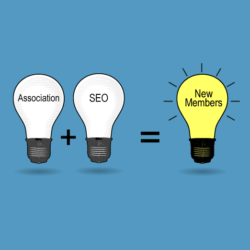 Optimizing association websites for search engines can seem daunting, so just start somewhere. The association SEO process can be as basic or complex as you choose to make it. You don’t have to “go back” and fix things or reinvent the wheel.
Optimizing association websites for search engines can seem daunting, so just start somewhere. The association SEO process can be as basic or complex as you choose to make it. You don’t have to “go back” and fix things or reinvent the wheel.
What Is SEO?
Search Engine Optimization (SEO) drives web traffic from organic (unpaid) search engine results.
SEO drives 22% of all website visits, and the majority of search engine traffic is generated by the big 3:
-
-
-
- Google 65%
- Bing (Microsoft) 20%
- Yahoo 13%
-
-
How Does SEO Work?
Search engines read (crawl) a site, evaluate the content, and then rank pages based on relevance to the user’s query.
High-quality content that answers the searcher’s question is key to improved positioning.
When it comes to SEO, go with quality over quantity. Relevant, robust content on fewer pages outweighs lots of pages with subpar, minimal content.
FYI: A large number of pages with minimal or duplicate content can be interpreted as an attempt to manipulate rankings.
Use Keywords to Improve Association SEO
Keywords are words that describe the content of a page or post and want your page to rank for. Include them throughout your association website for both your users and the search engine crawlers.
Warning: Determining keywords can be a research rabbit hole. Don’t fall in. You can adjust your strategy as you go.
The 10-Minute Keyword Strategy Plan
Quick Start Plan:
To drive relevant traffic to your site, take 10 minutes to identify relevant keywords with good search traffic potential. Then, using the outline below, make a keyword plan of action. Don’t let it overwhelm you. Simply start with these SEO basics for association websites. You can fine-tune and update your strategy later.
Identify Keywords
-
-
-
- Ask yourself, “What are people actually searching for?” to determine the most common way people search for information that relates to your association.
- Do a few searches based on your personal instinct and jot down a basic list with the most common keywords.
- Look for other ways other people might search for the same thing. Scan those results for other relevant keywords or phrases that didn’t make your first list and add them.
- Start including the keywords from your list in your website copy.
-
-
Grow Your Keyword List
-
-
-
- Stay informed about relevant topics that impact your ideal user.
- Subscribe to industry newsletters or follow question-answer sites (e.g., Reddit or Quora).
- Track forums, join social media groups, etc.
- These sources will help you determine trends and identify keywords that relate to them.
-
-
Dive Deeper
-
-
-
- Get details about actual keyword rankings
- Test a free keyword ranking platform
- Research keyword metrics behind the keywords you’re targeting.
- Determine the search volume of terms you’re targeting.
- Identify keyword difficulty (i.e., How difficult it would be for your association website to outrank competitive sites on a search engine results page?).
-
-
A keyword list is fluid in nature, so to continue to leverage current, relevant terms, add to it regularly. Once you begin to include them in your content, it will become second-nature. Remember, including keywords throughout your association website is beneficial to your users AND the search engine crawlers, both of which are beneficial to your association.